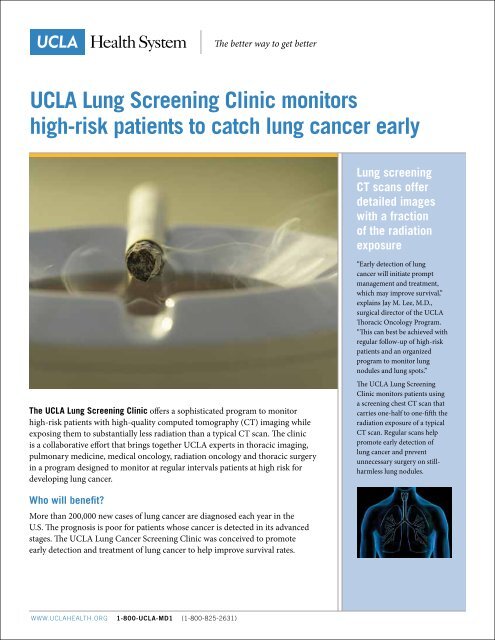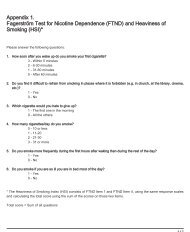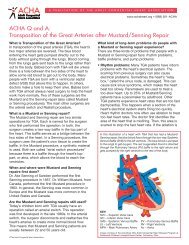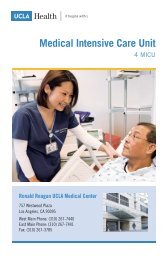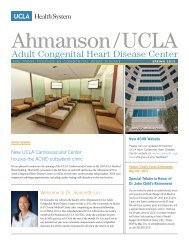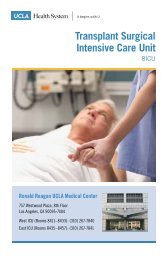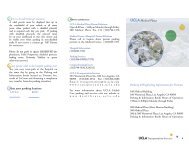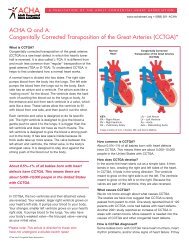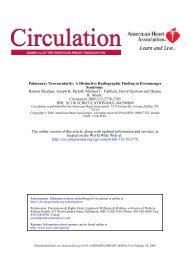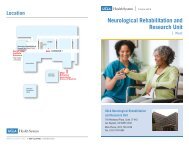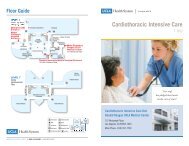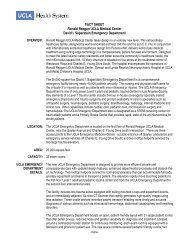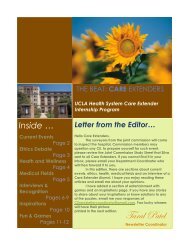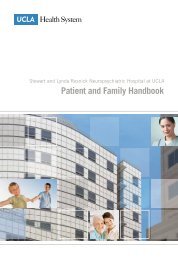Print Clinic Brochure (PDF) - Lung Cancer Program - UCLA
Print Clinic Brochure (PDF) - Lung Cancer Program - UCLA
Print Clinic Brochure (PDF) - Lung Cancer Program - UCLA
You also want an ePaper? Increase the reach of your titles
YUMPU automatically turns print PDFs into web optimized ePapers that Google loves.
The better way to get better<br />
<strong>UCLA</strong> <strong>Lung</strong> Screening <strong>Clinic</strong> monitors<br />
high-risk patients to catch lung cancer early<br />
<strong>Lung</strong> screening<br />
CT scans offer<br />
detailed images<br />
with a fraction<br />
of the radiation<br />
exposure<br />
The <strong>UCLA</strong> <strong>Lung</strong> Screening <strong>Clinic</strong> offers a sophisticated program to monitor<br />
high-risk patients with high-quality computed tomography (CT) imaging while<br />
exposing them to substantially less radiation than a typical CT scan. The clinic<br />
is a collaborative effort that brings together <strong>UCLA</strong> experts in thoracic imaging,<br />
pulmonary medicine, medical oncology, radiation oncology and thoracic surgery<br />
in a program designed to monitor at regular intervals patients at high risk for<br />
developing lung cancer.<br />
“Early detection of lung<br />
cancer will initiate prompt<br />
management and treatment,<br />
which may improve survival,”<br />
explains Jay M. Lee, M.D.,<br />
surgical director of the <strong>UCLA</strong><br />
Thoracic Oncology <strong>Program</strong>.<br />
“This can best be achieved with<br />
regular follow-up of high-risk<br />
patients and an organized<br />
program to monitor lung<br />
nodules and lung spots.”<br />
The <strong>UCLA</strong> <strong>Lung</strong> Screening<br />
<strong>Clinic</strong> monitors patients using<br />
a screening chest CT scan that<br />
carries one-half to one-fifth the<br />
radiation exposure of a typical<br />
CT scan. Regular scans help<br />
promote early detection of<br />
lung cancer and prevent<br />
unnecessary surgery on stillharmless<br />
lung nodules.<br />
Who will benefit?<br />
More than 200,000 new cases of lung cancer are diagnosed each year in the<br />
U.S. The prognosis is poor for patients whose cancer is detected in its advanced<br />
stages. The <strong>UCLA</strong> <strong>Lung</strong> <strong>Cancer</strong> Screening <strong>Clinic</strong> was conceived to promote<br />
early detection and treatment of lung cancer to help improve survival rates.<br />
WWW.<strong>UCLA</strong>HEALTH.ORG 1-800-<strong>UCLA</strong>-MD1 (1-800-825-2631)
Candidates for the <strong>UCLA</strong> <strong>Lung</strong> Screening <strong>Clinic</strong> include:<br />
• Patients with a previous history of lung cancer<br />
• Current and former smokers<br />
• Those exposed to second-hand smoke<br />
• Those exposed to asbestos<br />
• Patients with lung nodules or lung spots seen on X-ray or CT scan<br />
• Others at high risk for lung cancer<br />
How the clinic works<br />
New patients at the clinic are first seen by a thoracic surgeon and nurse<br />
practitioner, who review their medical history and any prior imaging studies.<br />
<strong>Clinic</strong> physicians determine an optimum schedule of follow-up imaging to<br />
detect cancer at an early stage when it is most treatable. These follow-up visits<br />
each include a screening chest CT scan — one that carries one-half to one-fifth<br />
the radiation exposure of a typical CT scan. <strong>UCLA</strong> thoracic radiologists<br />
interpret these screening CT images.<br />
Regular scans monitor patients’ lung nodules and lung spots, detecting changes<br />
that signal cancer while preventing unnecessary surgery on still-harmless<br />
nodules. The clinic draws on the knowledge and experience of a wide range<br />
of pulmonary and cancer specialists to offer patients access to a wealth of<br />
expertise. <strong>Clinic</strong> patients requiring further treatment can benefit from the full<br />
resources of a medical center rated among the top three in the nation by<br />
U.S.News & World Report.<br />
Key Personnel<br />
Jay M. Lee, M.D.<br />
Surgical Director<br />
Thoracic Oncology <strong>Program</strong><br />
Fairooz F. Kabbinavar, M.D.<br />
Medical Director<br />
Thoracic Oncology <strong>Program</strong><br />
Brian Barnes, N.P.<br />
Nurse Practitioner, Thoracic Surgery<br />
Steven M. Dubinett, M.D.<br />
Pulmonary Medicine<br />
Edward Garon, M.D.<br />
Thoracic Medical Oncology<br />
Michael T. Selch, M.D.<br />
Thoracic Radiation Oncology<br />
Robert Suh, M.D.<br />
Thoracic Imaging<br />
Contact Information<br />
(310) 794-7333<br />
Thoracic Surgery<br />
Email: lungcancerprogram@<br />
mednet.ucla.edu<br />
www.lungcancer.ucla.edu<br />
WWW.<strong>UCLA</strong>HEALTH.ORG 1-800-<strong>UCLA</strong>-MD1 (1-800-825-2631)<br />
9V1-02:11-08


